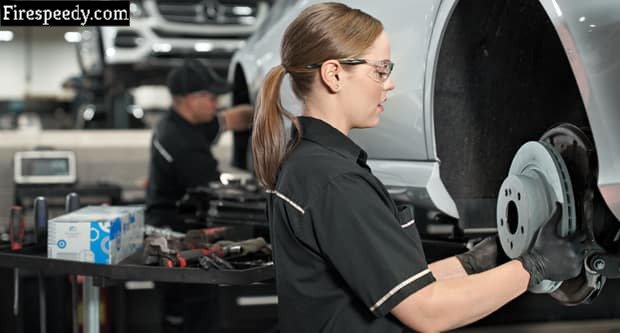If your brake pedal feels “soft”, vibrates or needs to be pushed farther than usual, if your vehicle swerves to the side when braking, or if you hear squealing. Now is the time to service.
Table of Contents
Replacing Brake Pads, Rotors And Calipers
Brake pads are bound to wear out and this wear is felt by squeaking. After a thorough inspection, it is common to simply replace ceramic brake pads. By neglecting maintenance, you risk a larger and more expensive brake repair, including the replacement of rotors and calipers.
1) How many types of brakes are there?
Brakes are devices used to slow down or block the movement of our car. There are two main types of mechanical brakes:
- Drum Brakes
- Disk brakes
Drum brakes are characterized by the presence of a rotating cylinder tied to the wheel and by two jaws that act directly on the cylinder itself.
More modern disc brakes work by means of a mechanism in which the pads anchored to the car body collide with the disc attached to the wheel and cause the wheel to stop. The shape and simplicity of this type of brakes allow it to be used on many different types of vehicles: obviously cars, but also motorcycles and bicycles.
It is important to know that disc brakes have now almost completely replaced drum brakes which are still used only for the rear wheel of scooters and low-powered vehicles. Clearly, in high-quality companies such as Ferodo, you can find components for both types of brakes.
2) Brake pads: what are they?
The brake pads are a key component of the disc braking systems and are responsible for friction, that action that allows the car braking. The base of the pad is usually made of metallic material, which is also resistant to the high temperatures generated during braking.
A mixture of materials is applied to the base to generate the friction necessary to stop the vehicle. It is interesting to see how technology is advancing in this field too, in fact, the most modern and high-quality pads such as Ferodo ones are made of ecological materials.
There are different types of pads, but the high-quality ones guarantee the perfect efficiency of the vehicle under all possible conditions (high and low speeds, high and low operating temperatures), also guaranteeing an acceptable duration that can vary depending on the routes and the driving style.
3) How often should the brake discs be checked?
Like the other mechanical parts of the car, the braking system is also subject to wear. Unlike what you might think, driving with worn brake discs is very dangerous, both in the city and on the highway. The reduction in speed, in fact, does not limit the risks.
But how long do brake discs last?
It is not possible to establish this objectively because there are many factors that can influence it. First of all, the type of road traveled. Driving in the city, in fact, causes wear of the brake discs faster than driving on the motorway. Because urban journeys force you to hit the brakes more and more frequently. Secondly, it depends on the type of car and the driving style of each person.
When to change car brake discs?
On average, although as we have said it depends on the use made of the vehicle, the brake pads and discs must be checked every 30,000 km. The brake pads must be replaced when it still has 3 mm of the friction material and the discs when the thickness reaches the minimum allowed (data detectable on the incision on the edge of the same).
4) Are there any signs that tell us when to replace brake components?
If in principle the rules already described above are to be followed, it is important to remember that there are two precise signs that can mean a problem with the braking system.
The first is a dry grating sound when braking. This must be the alarm bell that lets you know when it’s time for a check-up because the pills have probably worn out. Another point that must draw your attention is the brake pedal which vibrates and lengthens the pedal travel.
When you feel pedal vibrations under normal braking, it means that the brake discs are deformed. In both cases, contact a workshop to do a more thorough check and solve the problem.
5) Can I change the brakes by myself?
Replacing the brake pads or discs is an apparently easy operation, but if it is done without the right precautions or tools it can cause serious problems to the safety of the vehicle.
If you want to proceed on your own, our advice is always to use high-quality spare parts such as Ferodo pads and have an expert person assist you during the disassembly and assembly work and use the correct tools such as the torque wrench for the tightening of the wheel bolts.
Bring your car to us and we’ll do a brake system checkup. Write the address or even just the zip code to find the car workshop closest to you!
Recent Posts
- What Does A Car Amplifier Do For A Car Stereo?
- The 5 things you need to know about brakes and pads
- 10 things to know about changing the oil and filter
- How to Choose the Best Vans for Van Life
- How Much is a Scrap Car Worth? Understanding Your Car’s Value

